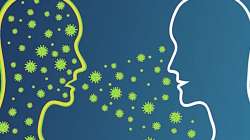Coronavirus airborne? Know what is airborne disease and how you can prevent yourself from getting one
WHO has said there is evidence that the coronavirus is airborne and even smaller particles can infect people. In the times when the scare is increasing, it is crucial to know what exactly airborne diseases are and how an individual can protect themselves from getting or spreading one.

The World Health Organization (WHO) said there is emerging evidence that the Novel coronavirus can be spread by tiny particles suspended in the air. More than 200 scientists from 32 nations have written to the WHO, saying there is evidence that the coronavirus is airborne and even smaller particles can infect people, a significant departure from the UN health agency's claims so far that COVID-19 is spread primarily through coughs and sneezes. A report in The New York Times says that clusters of infections are rising globally as people go back to bars, restaurants, offices, markets and casinos, a trend that increasingly confirms that the virus lingers in the air indoors, infecting those nearby. In the times when the scare is increasing, it is crucial to know what exactly airborne diseases are and how an individual can protect themselves from getting or spreading one.
What are airborne diseases?
Spread through small pathogens like bacteria, fungi, viruses in the air, airborne diseases infect a person through sneeze, cough, talk. The airborne diseases include--
- Common cold
- Influenza
- Measles
- Chickenpox
- Mumps
- Tuberculosis
- Whooping cough (pertussis)
What are the symptoms of airborne diseases?
The symptoms are similar to the common flu but can also include--cough, sore throat, runny nose, chill, muscle and body aches, fatigue, headache, congestion, sinus pressure, etc.
How can you prevent airborne diseases?
- Wash your hands thoroughly for at least 20 seconds.
- Avoid contact with the ones who are sick or have symptoms.
- Stay at home if you are not fine.
- Wear a mask in public to spread and breathing of the harmful pathogens.
- Avoid public gatherings.
- Avoid touching the face, nose, and eyes.
Coming back to COVID-19 being spread through air, WHO officials have cautioned the evidence is preliminary and requires further assessment. Benedetta Allegranzi, the WHO's technical lead for infection prevention and control, said that evidence emerging of airborne transmission of the coronavirus in "crowded, closed, poorly ventilated settings that have been described, cannot be ruled out."
For months, the WHO has insisted that Covid-19 is transmitted via droplets emitted when people cough or sneeze. Droplets that do not linger in the air, but fall onto surfaces - that's why handwashing has been identified as a key prevention measure.
-With PTI inputs